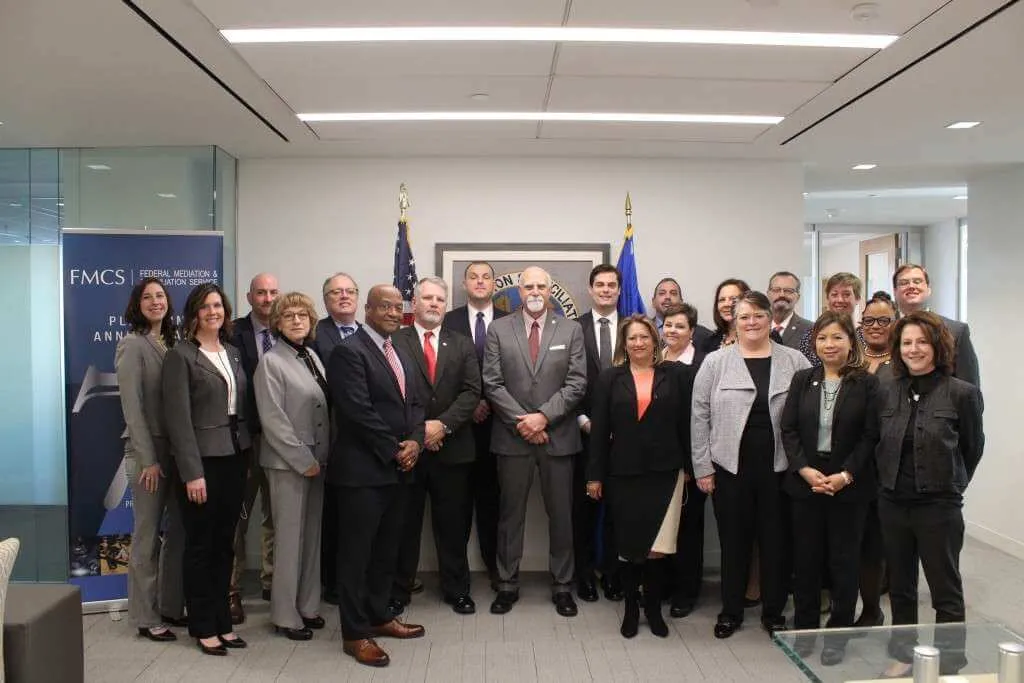
The Federal Mediation and Conciliation Service (FMCS) is the nation’s largest independent agency for alternative dispute resolution (ADR) and conflict management, providing mediation and conflict resolution services in the private, public, and federal sectors.
When thinking of mediation, most people assume that a mediator will be a private person that the parties hire to help them resolve the dispute between them in a way that is agreeable to all the parties.
In most cases, it is true that a mediator will be privately funded; however, in certain labor disputes, it may be possible to receive a public mediator through an agency known as the Federal Mediation and Conciliation Service (FMCS). Because the agency only deals with labor disputes, it is not always well known outside of the labor mediation sector, but it can be a fantastic resource for organizations and businesses that are facing workplace disputes and would like to resolve the dispute in a way that helps both the union and management.
This article will discuss the origins of the Federal Mediation and Conciliation Service and what the purpose of the agency is, as well as discuss the role that federal mediators play in the process and how to become a federal mediator.
History and Mission of the Federal Mediation and Conciliation Service:
The FMCS was founded in 1947 under the Labor Management Relations Act of 1947 (Taft-Hartley Act) to replace the United States Conciliation Service within the Department of Labor. The Federal Mediation and Conciliation Service was founded by Congress as a neutral and independent agency. The agency’s mandate and mission are to prevent and minimize the impact that labor-management disputes on the free flow of commerce.
The Labor Management Relations Act accomplishes this by providing mediation, conciliation, and voluntary arbitration. As the agency has grown and evolved, it has developed a mission statement that expands on that statutory intent.
Federal Mediation and Conciliation Services website states that the agency’s mission is to:
- Promote the development of sound and stable labor-management relationships;
- Prevent or minimize work stoppages by assisting labor and management to settle their disputes through mediation;
- Advocate collective bargaining, mediation, and voluntary arbitration as the preferred processes for settling issues between employers and representatives of employees;
- Develop and advocate the art, science, and practice of conflict resolution services; and
- Foster the establishment and maintenance of constructive joint processes to improve labor-management relationships, employment security, and organizational effectiveness.
In addition to this mission, the Federal Mediation and Conciliation Service also states that they value absolute neutrality, confidentiality, and acceptability to customers. The agency emphasizes the relationships that need to be present between the management and unions to keep communication open and help the parties work through their disputes. They also encourage the use of collaborative, problem-solving approaches to solving disputes. Because of the statutory mandate, the Federal Mediation and Conciliation Service must prioritize disputes that will likely have the largest impact on interstate commerce and public health and safety.
Today, the Federal Mediation and Conciliation Service is headquartered in Washington, D.C. with many field offices around the country. Besides mediating disputes across the country, the Federal Mediation and Conciliation Service also provides training programs and develops relationships between management and unions to encourage peace and collaboration. Outside of the labor sector, the agency is also able to mediate disputes and provide other services to government agencies, and their labor relations programs.
FMCS Services
The FMCS offers several services that aid in the dispute resolution process for labor organization disputes and promote labor-management peace. These services include:
- Collective Bargaining Mediation: The agency’s main function is to mediate disputes during this style of bargaining. This is a voluntary process where a third party neutral (the mediator) helps the two parties to reach a collective bargaining agreement.
- Grievance Mediation: When a dispute is centered on a contractual violation of another grievance that a labor union has against management, grievance mediation is a step that unions may take to try and solve the issue and heal the relationship without causing lasting damage.
- Arbitration Services: The agency maintains a list of qualified arbitrators nationwide to provide referrals and facilitate arbitration. The agency also promotes the advancement of fair and effective labor arbitration.
- Relationship Development and Training: Federal Mediation and Conciliation Service also provides customized training for labor unions and management to assist in building the relationships necessary to allow communication and bargaining without interrupting commerce.
- Education, Advocacy, and Outreach: The Federal Mediation and Conciliation Service provides education to people around the country to educate people on this type of bargaining process. The agency also helps advocate for the use of alternative dispute resolution and provides outreach to accomplish this.
- Employment Mediation and Non-Collective Bargaining ADR Services: Federal Mediation and Conciliation Service also provides services to certain employment and regulatory disputes and public policy issues that are not labor-based. This includes mediation as a litigation alternative, and consultation, convening, design, training, and neutral services.
- ADR Services for Government: The Federal Mediation and Conciliation Service is able to provide employment mediation services to both federal agencies and state and local governments.
Benefits of a Mediator in Collective Bargaining
This process is often time-consuming and can bring many challenges that the individual parties are not always completely able to discuss or provide. Because the livelihood of the union workers and the needs of the business and management are at odds, it can be very difficult for the parties to reach an agreement on their own. This is why it can be so beneficial to add a mediator to the bargaining process, especially when emotions are high and the dispute threatens so much. Several benefits of using a mediator include:
- Control: Unlike litigation and arbitration, mediation allows the parties to stay in control of the dispute and create and control the resolution. It allows the parties the freedom to agree, where they would have to accept a judgment from litigation.
- Informal: Mediation allows the parties to bargain in an informal process. While litigation is bound by the rules of evidence and the court, mediation allows the parties to speak freely and bargain together.
- Time: Mediation can be done in a day or two, while litigation often takes a long time to complete and have a decision, further interrupting commerce and harming workers.
- Cost: Mediation is typically more cost-effective than litigation.
Mediator Skills
A mediator can also bring a unique set of skills that are helpful for a collective-bargaining mediation. These include:
- Clarification: The mediator has the ability to clarify issues for each side and help the parties understand the interests underlying the positions that the other side is taking,
- Option: Depending on a mediator’s style, they may suggest options for the parties to help the parties begin problem-solving, particularly by helping the parties to focus on the underlying interests and not be distracted by the other issues.
- Suggestions: A mediator is able to make suggestions for both procedural and substantive issues.
- Diplomacy: A mediator is able to participate in shuttle diplomacy, where they move back and forth between the parties in separate rooms. This gives the parties time to come up with ideas. Most parties are also more willing to share their thoughts and needs with only the mediator, rather than in front of the other party. This combination can breathe new life into the parties and their positions.
- Alternatives: Mediators are able to facilitate discussions on the alternatives proposed by the parties. They are able to evaluate the short- and long-term effects of each proposal. They are also able to give some guidance as to what may happen if there is no agreement. This will help the parties have an accurate picture of their position and the other position.
- Expectations: Through all of the skills listed above, the mediator is able to provide realistic expectations for what is possible in the mediation. This can give the parties the ability to evaluate their options and make informed decisions.
Becoming a Federal Mediation and Conciliation Service Mediator
FMCS mediators promote the development of sound and stable relationships in the private, public, and Federal labor-management sectors. This is done by advocating for the practice of collective bargaining, mediation, and arbitration. If this is something that sounds exciting, it may be accomplished by gaining experience in the labor and management field. Mediators in the Federal Mediation and Conciliation Service must meet minimum qualifications. These include full-time experience that uses the concepts and theories of bargaining, alternative dispute resolution, negotiation, or conflict resolution. The Federal Mediation and Conciliation Service website states that this experience must have been gained through one or more of the following roles:
- A chief spokesperson representing labor or management
- The second chair representing labor or management
- Benefits expert
- Mediator
- Consultant
- Facilitator
- Trainer
Additionally, the mediator candidate must be a U.S. citizen and be willing to relocate to the assignment office from the FMCS.
Because education is an important aspect of what the FMCS does, it may also be beneficial to take part in a class or conference put on by the Federal Mediation and Conciliation Service. The agency has the Federal Mediation and Conciliation Service Institute which trains individuals and groups in the issues affecting labor and management. There are also collaborations with many universities to provide training for neutrals and expose young people to the profession. Finally, the agency hosts the National Labor-Management Conference to provide continuing training for practitioners and experts. There are panels, workshops, and speakers that update the attendees on trends, techniques, and tools that can be used in labor relations. Attendance would provide valuable insight into the field.
Conclusion
Labor organization disputes are often a point of high tension, and litigation often adds another layer of emotion to the situation. Having a mediator step in to help the parties reach an agreement can be valuable to both sides to accomplish what is needed and avoid or mitigate any adverse consequences of the dispute.
The FMCS provides skilled mediators and advocates for greater use of such tactics and gaining experience with labor dispute and mediation may provide an entry point into the Federal Mediation and Conciliation Service and a career as a federal mediator. Undertaking such a career can be incredibly rewarding, both for the mediator and the labor-management relationships that the mediator encourages and builds.
To learn more about FMCS, mediation, and more, contact ADR Times!
Must-read Articles:
- Understanding the Business Litigation Process - July 23, 2024
- Average Settlement Offers During Mediation - June 26, 2024
- Binding Mediation: An Affordable ADR Option - June 25, 2024


